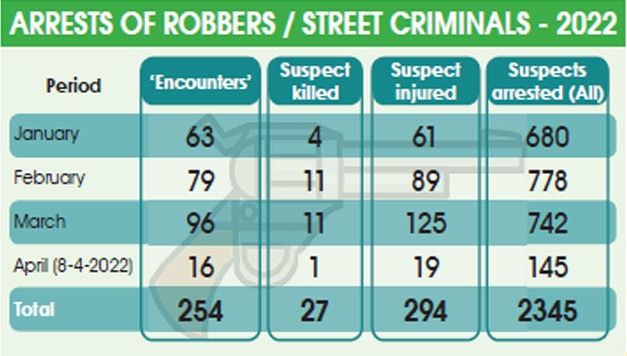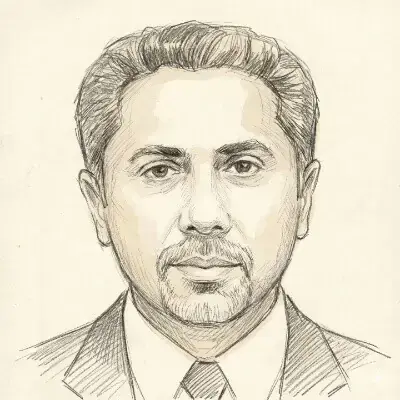• 27 suspects killed, 294 hurt since January
• Experts question strategy of rapid ‘encounters’
• Police approach termed short-sighted
KARACHI: An alarming rise in the menace of street crime has compelled the Karachi police to do what its chief called ‘proactive policing’ that led to over 250 alleged police encounters all across the city from January in which 27 suspects have been killed and around 300 others wounded.
While the police claim that the number of street crimes is on a decline, experts believe that the law enforcement agency is focused on delivering “swift justice” to ease the growing pressure by adopting a “short-sighted strategy”.
Official data suggested that the number of alleged police encounters and suspects killed and wounded registered an increase since January.
From January 1 to April 8, as many as 27 suspected robbers were killed and 294 others hurt in 254 alleged encounters in the metropolis. The number of suspects arrested by the police stands at 2,345 during the period in question.
In January, four suspects were killed and 61 wounded in 63 “encounters” in the city.

In February, the number of “encounters” reached 79 in which 11 suspects were killed and 89 hurt.
In the month of March, a total of 96 ‘encounters’ took place in the city in which 11 suspects were killed and 125 wounded.
During the first eight days of the current month, a total of 16 encounters took place in which one suspected robber was gunned down and 19 were wounded.
‘Proactive policing’
“Karachi police are doing proactive policing by challenging the repeat criminals by knocking their doors,” city police chief Ghulam Nabi Memon told Dawn when asked to comment about the increasing number of shootouts.
“We have made a mechanism to collect CCTV footage, identification of the criminals and their hot chase to pre-empt them from commission of crime,” he said.
“It is a humble effort on our part to minimise the crime. Let us hope that we can bring some positive change so that people feel good about police,” he said.
A senior police officer, who wished not to be named, said he was against “encounters”. “But corruption perpetuates crimes as well as criminals get away with their crimes because of money.”
He said four police teams had been deployed at Khuzdar, Quetta, Kamber-Shahdadkot and Sajawal on a permanent basis to keep a strict vigil on criminals, who came to Karachi to commit crimes.
‘Trigger-happy’
“When crime graph goes high, police come under pressure and resorted to encounters,” said former chief of the Citizen-Police Liaison Committee Jamil Yousuf. “But it created deterrence against criminals for a short-term.”
He said under such pressure policemen became trigger-happy.
Security analyst Dr Zoha Waseem, who is a criminology professor at University of Warwick, also corroborated Mr Yousuf’s views.
“Police encounters, extrajudicial killings, or half-fries, full-fries, as they are sometimes called, are all symptoms of police reacting under pressure and being trigger-happy,” she said.
“Policing in Karachi has always been reactive, focused on delivering swift justice [sasta insaf].”
“When crimes go up, the police come under pressure from the government and society. People need someone to question, blame, and criticise. The police are the first targets of this. The police thus have to show they are responding to these crimes, and encounters become a kind of performance to show that the police are performing well,” Dr Waseem explained.
She continued: “As a strategy, encounters [for injuring or killing] are a way to show police progress and performance, and to instil fear in the minds of the criminals to somehow deter them from committing crimes.
“It’s a short-sighted strategy, of course, and the police are always a few steps away from overplaying their hand, which is what happened in the case of Naqeebullah Mehsud and, last year in Arsalan Mehsud’s.”
She opined that the “encounters” would not control crimes.
“Police violence is purely a response and a reaction. It cannot prevent crimes. At most, police violence may temporarily deter and scare criminals, but they will always return,” she said.
She observed that to an extent, “encounters” reflected the failure of the criminal justice system, but they also demonstrate weaknesses in governance at large.
Curbing crimes
Jamil Yousuf, the former CPLC chief, suggested that the police and Rangers should divide their resources and start random checking and patrolling, which would also likely help deter the criminals.
He recommended that specialised crime analyses of the CPLC should be utilised for curbing street crimes. “The CPLC has record of crime patterns and identified the areas where the criminals feel ‘comfortable’ for carrying out crimes.”
He said well-planned patrolling and checking should be carried out at those areas where crimes were rampant.
Dr Waseem suggested that tackling urban crime for the long-term required better policies on the part of the government. “Without structural changes, you will continue to have collusions between politicians, police officers, and criminals, and crime will not be controlled.”
“Encounters cannot bring about structural changes that are required to prevent people from committing crimes; at most they can give a false sense of security that the police are doing something,” she said.
Published in Dawn, April 13th, 2022

































